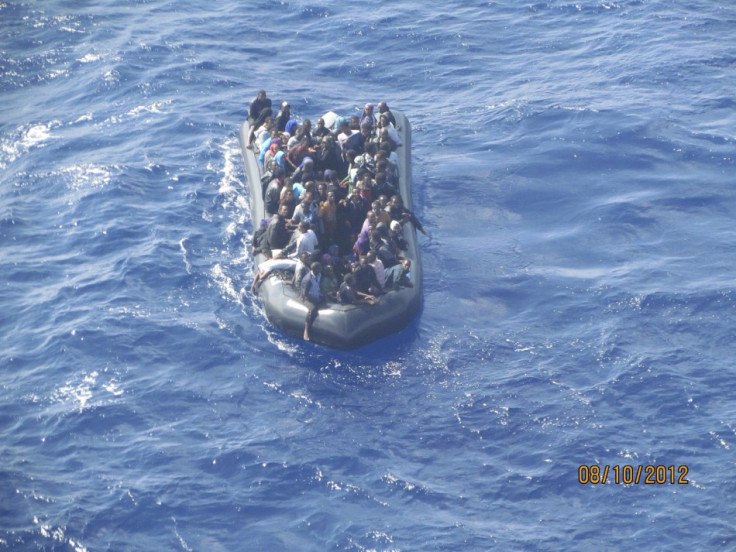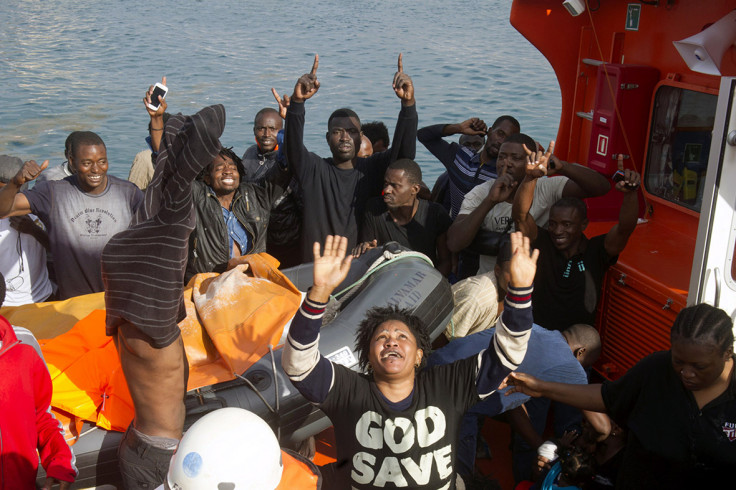Risking Death for a Shot at Life: One Smuggled Human's Year-Long Journey from Africa to Europe

BORGO MEZZANONE, ITALY: Ebrima's bedroom is a stark corrugated square, five metres long and five metres wide. He shares it with one other asylum seeker – each has a foam mattress over a camp bed to sleep on. Wires dangle from a broken light in the ceiling and the floor is carpeted in dust, crumbs and the odd seashell.
The Asylum Seekers Reception Centre at Borgo Mezzanone, Southern Italy, has been his home for the past six months. In this disused airbase which was turned into a detention centre, conditions are dire. But after a harrowing journey from Africa, through the Sahara and across the Mediterranean, Ebrima doesn't even seem to notice. He is happy to be here.
He tells me his journey started in Sierra Leone after the death of his Muslim father. The Christian community where he lived wanted him gone. Even his stepmother's family tried to force him to convert from Islam to Christianity.
"My stepmother's family were not good people. They threatened me with violence and told me to choose Christianity or leave. So I had to leave," Ebrima said when we met at the reception centre.
Ebrima speaks in English, animatedly and articulately. He wears a red t-shirt and shorts, with a wide red baseball cap cocked on his head at a jaunty angle. He refuses to be cowed by the tough hand life has dealt him.
"I'm 20, I am young. Sierra Leone was a mess. I want a better life, but I need stability and an education."
The risks he has been prepared to take to find that stable life are astonishing. He says he left home without money or a passport, travelling only with his student ID. A trained mechanic, he took the bus to Mali and spent a month working his way to Burkina Faso, then to Niger. There he worked for three more months, saving money for the border crossing through the Sahara to Libya. It was in Niger's dusty capital, Agadez, where he says he made contact with a group of smugglers.
"An Arab man offered to get me into Libya. It cost 20 dollars up front and I would work for him there until I paid off the rest ($580 USD). A lot of money, but I was determined."
Afraid to get caught, the smugglers don't take the mountain road through Algeria to Tripoli. Instead they plough their Toyota pick-up trucks through close to 2,500km of Saharan desert to Sabha. Ebrima has a bright and lively personality, but his hands go deep into his pockets and he looks down at his feet when I ask how he got to Libya.
"It's difficult to talk about that journey," Ebrima says. "Thirty-seven people in a pick-up, driving for seven days. We had some food and water, but the sun burns your skin and the sand sticks to it. Two guys in our group died. We passed one, two, three more bodies on the road – they had been thrown out of the trucks before us. In the desert you don't have time to bury bodies."
Things weren't much easier in Tripoli. A black sub-Saharan African in Libya is an instant target for security forces – and migrants and asylum-seekers can be held indefinitely if caught. Those without correct documents are particularly at risk. Ebrima says he was forced underground, cooking and cleaning as a domestic worker to repay the cost of his journey across the Sahara, and saving for the $1,100 boat crossing to Europe.
Fraught with danger
Ebrima describes how working in Libya without a valid permit is fraught with danger. Over the next few months, he became friends with Bubacary, another African domestic worker, who had arrived in Libya slightly earlier than Ebrima. Once Bubacary had saved enough for the crossing, he collected his pay and was sneaking home from work after dark when he was stopped by a group of armed men. They demanded he hand over his money, he refused. They shot Bubacary in the leg, then the shoulder, then they took the $1,100 dollars.
When Ebrima found Bubacary he was bleeding heavily, but they had to wait hours for their Libyan employer to bring him to hospital. As two sub-Saharan African men, they feared they would have their documents checked, and time in a Libyan immigration detention centre could lead to death. Bubacary died the next day.
The following week Ebrima made the crossing to Italy. The smugglers jammed him onto a small fishing boat with 150 others and handed them a compass and walkie-talkie. They were told to head north and call the Italian Navy as soon as they were out to sea, but it wasn't long before they were lost. Ebrima and the others drifted three days before they were picked up and taken to the Italian base at Lampedusa, Sicily.

Six months on, Ebrima is awaiting the result of his asylum application. If he's rejected, he will be handed a note instructing him to leave Italy in seven days. He's optimistic, but even if he is granted asylum here in Italy his future is uncertain. His English is good, but his Italian non-existent. He told me what he really wanted to do was to work as a mechanic in England, and asked why the UK is so hard to immigrate to. I couldn't answer.
Italy is rescuing and accommodating thousands of people crossing the Mediterranean each year, much more than any other European Union country. Meanwhile other European countries close their borders, detain those that make it through and even push crammed boats back into the sea. Forced out of their homes in fear of violence, people like Ebrima have remarkable stories of endurance. They risk everything to find sanctuary, only to falter at the gates of Fortress Europe.
And it's not just young men from sub-Saharan Africa, looking for a better life. The crisis in Syria provides another chilling example - just 2.4% of those who have fled the country have managed to get through and claim asylum in the EU. Europe must do more. Northern European countries must strengthen the search and rescue capacity in the Mediterranean – identifying boats in distress and assisting those on board. And they must treat those they rescue with dignity, give them access to asylum procedures and stop once and for all unlawful operations to push refugees and asylum-seekers back across the border.
Maxim Tucker leads Amnesty International's media work on Global Campaigns and Thematic Issues. You can find him on Twitter here or go to the Amnesty website to find out more about their current campaigns.
© Copyright IBTimes 2025. All rights reserved.




















